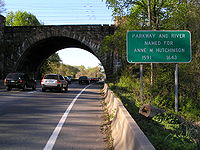Key:name:etymology
| Description |
|---|
| The subject commemorated in the name of an element. |
| Group: names |
| Used on these elements |
| See also |
| Status: in use |
| Tools for this tag |
|
This key records the namesake of a feature; in other words, it is a basic etymology of the feature's name.
In general this key is used when the source of the name for a street (or other element) is non-obvious or different possibilities require disambiguation (e.g., Addison Street in the UK many be named after both a ![]() writer and a
writer and a ![]() government minister who pioneered social housing. In some countries, such as Switzerland, streetname signs often provide basic information of this kind in smaller text. Avoid using if the meaning of the name is self-evident or generic (Station Road, Main Street, High Road, Meadow Lane etc.).
government minister who pioneered social housing. In some countries, such as Switzerland, streetname signs often provide basic information of this kind in smaller text. Avoid using if the meaning of the name is self-evident or generic (Station Road, Main Street, High Road, Meadow Lane etc.).
Rationale
The way in which a community names its institutions and infrastructure can indicate that community's values. Sometimes, the namesake of a feature is notable enough that a plaque is posted to explain the namesake. Other times, the connection is known only by word of mouth. Either way, mappers with sufficient interest in a locality can provide a level of detail that is only possible in a grassroots project like OpenStreetMap.
Knowing the namesake of a feature can help a user pronounce or spell the name=* correctly. A seemingly mistaken or misspelled name may make more sense when the namesake is tagged. A search engine could use the etymology to index alternative names based on variations of a person's name (for example, omitting the given name). Some social equity projects are focused on populating OSM with namesake data to facilitate external advocacy projects.
It would be extremely difficult for a data consumer to parse name=* for a person's name and reliably guess whose name it is. For example, a "Washington Plaza" may be named after the president, the capital city, or the state. Moreover, a "George Washington Carver School" would be named after the scientist and inventor.
How to map
Set the name:etymology=* key to the namesake's full name and add name:etymology:wikidata=* if Wikidata has an item for it. For example:
- name=Calshot Road
- name:etymology=RAF Calshot
- name:etymology:wikipedia=en:RAF Calshot
- name:etymology:wikidata=Q7275214
This key is intended for a name or sometimes a word, but not a full etymology tracing the evolution of that word, as one would find in a dictionary.
Only tag an etymology if you are reasonably sure about it, for example by inspecting a commemorative plaque or consulting a reliable source about a place's history. Local knowledge and common sense can often help, but beware of false etymologies. For example, a "Martin Luther King Drive" is more likely to be named after the assassinated civil rights activist than his similarly named father, but a "King Drive" may have been named after any number of obscure people with that surname, or to royalty, even if locals believe otherwise.
The name:etymology:wikipedia=* and name:etymology:wikidata=* keys avoid ambiguity from a name that may belong to multiple people throughout history or a name that is spelled multiple ways (for example, with or without a middle initial). It also lets us link to the Wikipedia article about the namesake, and enables applications to access data from external databases (e.g. "find all streets named after dead poets"). Avoid using wikipedia=* and wikidata=* to indicate the namesake; these keys are for Wikipedia and Wikidata entries about the feature itself.
A monument or memorial typically commemorates the person for whom it is named, so add subject=* and subject:wikidata=* alongside the etymology tags. If a feature is planned to be renamed after somebody in the future, one may use proposed:name:etymology=*. You can add the *:etymology=* suffix to any name key, for example official_name:etymology=* and name:en:etymology=*.
Examples
Almost anything that can be tagged with a name=* could have a namesake, for example:
- A school, park, or hospital named after a famous individual, a local benefactor, or the surrounding neighborhood
- A place of worship named after a religious figure
- A shop named after its owner (owner=*)
- A commercial or retail building named after its anchor tenant
- A stadium named after a company that has purchased naming rights
- A road named after its origin or destination, a notable event, or a former roadside attraction
- A road named after a tree or bird species, often part of a systematic naming scheme
- A place named after another place far away
- A place named after a nearby body of water or vice versa
Implementation notes
Editors and data consumers may need to special-case this key and other subkeys of name=* that do not represent localized versions of the name=* key. [1]
Possible Synonyms
See also
- subject=* — for indicating the topic that a mapped item is about, not merely named after (applicable to e.g. museums, artworks, flags, information boards, memorials, etc.)
- Sophox query for Whig memorials and namesakes – demonstrating how to cross-reference Wikidata for tangential information about a name etymology
- Open Etymology Map – Interactive map that shows the etymology of streets and points of interest based on OpenStreetMap and Wikidata
- MapComplete Etymology, a Theme to help filling etymology tags in OSM
- “Mapping Diversity”. Retrieved June 2023. uses OSM data to show the street names named after men in various European cities
